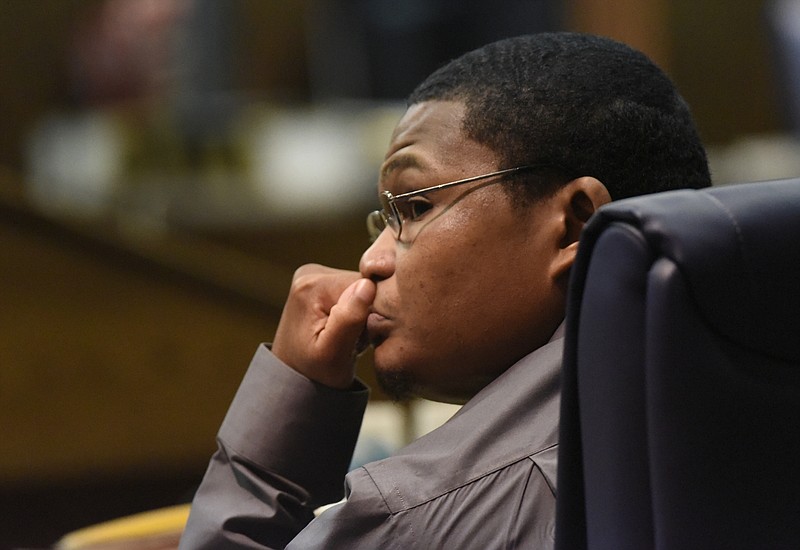In a quiet but clear voice, Rodney Jennings recounted the moment he shot and killed Raphael White.
Jennings told jurors on Thursday, the third day of his murder trial, he saw a firearm in White's back pocket in the tense moments before the shooting on Jan. 28, 2014, and he fired his own weapon only when White reached for that gun.
"When I fired the shot, he just stood there," Jennings said, dressed in a black button-up shirt and silver tie, glasses perched on his nose.
He looked down.
"He just stood there," he repeated.
A long, silent moment passed before defense attorney Brandy Spurgin spoke.
"What happened next?" she asked.
"Then he just fell straight back, like, just, he couldn't take a step," Jennings said.
Jennings' testimony Thursday contradicted testimony from other witnesses who testified for prosecutors Wednesday. Those witnesses said White never had a gun that night. Police did not recover a weapon from the scene of the crime, an apartment on Sixth Avenue.
Jennings was the first witness called by attorneys Spurgin and Brian Pearce as they began to build their defense Thursday. The attorneys portrayed White as a dangerous man who was prone to violence, and they laid out several confrontations that White and Jennings had in the years before White was killed.
They argued Jennings was afraid of White and that he acted in self defense when he fired that night.
Jennings arrived at the apartment around 6 p.m. to try to see his two children, who he fathered with White's cousin, Cheslea Thompson.
In animated testimony, Jennings told the jury he was waiting by himself for his children inside a small kitchen when White, White's brother and Thompson came into the room and surrounded him.
Before the jury, Jennings stood and mimed how he put his hands up, how he said he didn't want any trouble. He said Raphael White muttered a threat as he reached for his weapon.
"He said, 'If you don't want no problems, there is gonna be some problems,'" Jennings said.
After the shooting, Jennings fled on foot, ditched his gun and made his way to Memphis, where investigators found him two months later. Prosecutors have argued Jennings was the aggressor and that Jennings fired at an unarmed White as he backed out the apartment door.
Although prosecutors finished their case Thursday morning, they got another chance in the afternoon after Judge Tom Greenholtz agreed to let Spurgin and Pearce use gang-related evidence.
Spurgin revealed a black bandana collected from the scene that Jennings said was tied around Raphael White's gun. That bandana, Jennings said, symbolized the Gangster Disciples - and it meant "wartime."
"In that moment when you see that black flag, how did that make you feel?" Spurgin asked.
"I began to fear for my life," said Jennings, adding that using his firearm "was the only way I could defend myself at the time."
And because he feared widespread gang retaliation, Jennings never called police when he fled to Memphis.
During cross-examination, prosecutor Cameron Williams said Jennings made the case about gangs when it really boiled down to retaliation over a June 2013 domestic violence incident.
Highly intoxicated, Jennings got into a screaming match with Thompson, Williams said. He punched her in the face, shoved one of his sons, and broke a window when he tried to re-enter her home, Williams said.
He was issued a no-trespass citation and served six months in jail. When he got out in December 2013, he made contact with Thompson and he violated that citation when he returned to her home in January 2014.
Throughout the cross-examination, Williams questioned Jennings on his own gang involvement, asking the 29-year-old if he was a Vice Lord. Jennings denied any involvement and said no gang members helped him flee to Memphis.
Williams circled back to the murder weapon, a .38-caliber gun that Jennings said he bought for $100 from "a junkie" in St. Elmo. Williams said Jennings knew the domestic violence episode enraged Thompson's family members.
And then, Williams said, he went over to the apartment complex with a concealed weapon.
"Not only were you breaking the law by just being there," Williams said, referring to the no-trespassing citation. "You were also breaking the law by carrying a concealed weapon."
The defense will continue its case today in Greenholtz's court at 9:30 a.m., followed by the state's rebuttal.
Contact staff writers Shelly Bradbury and Zack Peterson at sbradbury@timesfreepress.com or zpeterson@timesfreepress.com. Follow @shellybradbury and @zackpeterson918.
